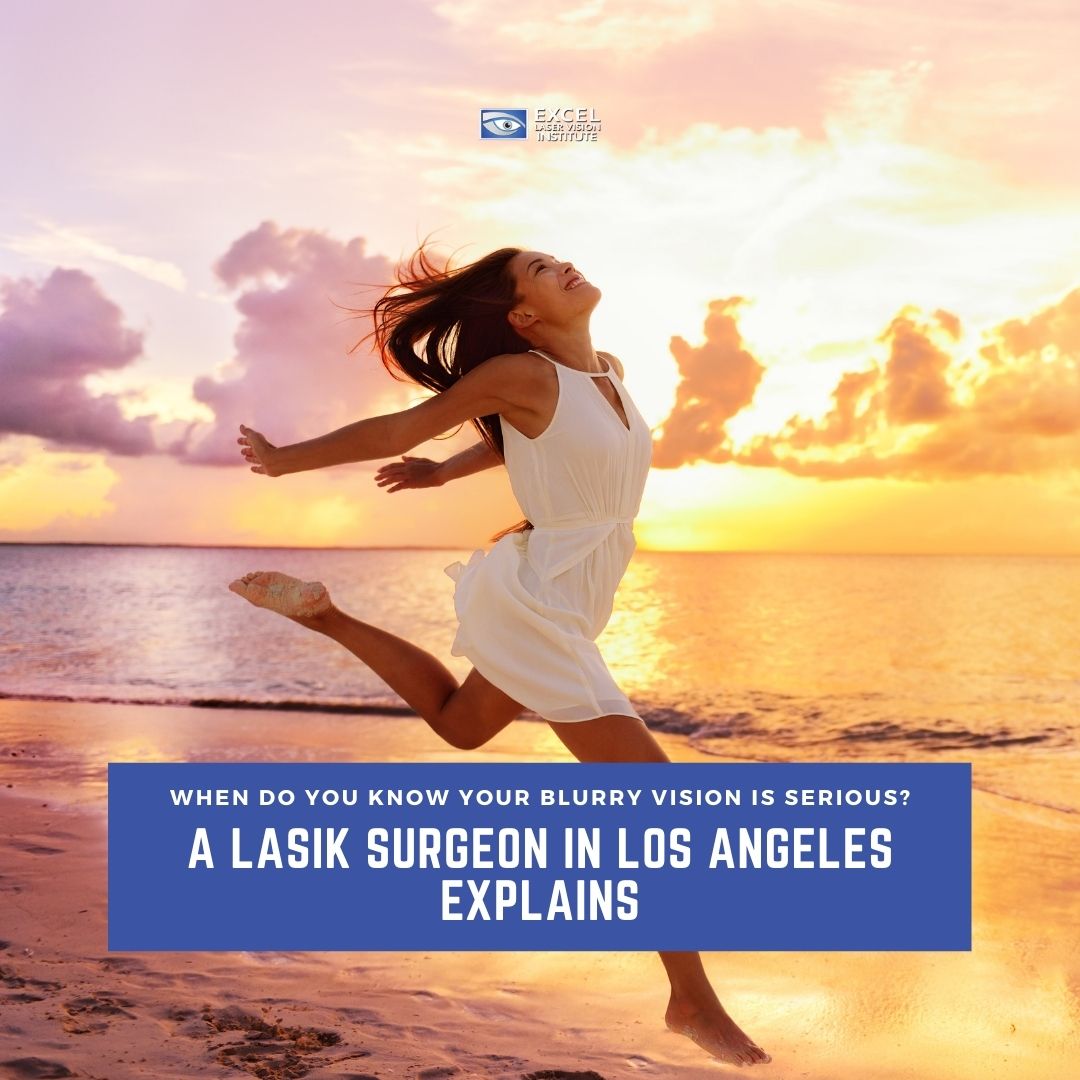
When Do You Know Your Blurry Vision Is Serious? A LASIK Surgeon In Los Angeles Explains
LASIK doctors in Los Angeles can all agree that blurriness is one of the most common complaints they have from patients, and most of the time it is nothing to worry about. That is because most experts of LASIK eye surgery will tell you that blurriness could just be a sign that your glasses or contacts prescription requires updating. However, there are times that doctors notice that a patient’s fuzzy vision is something more to worry about.
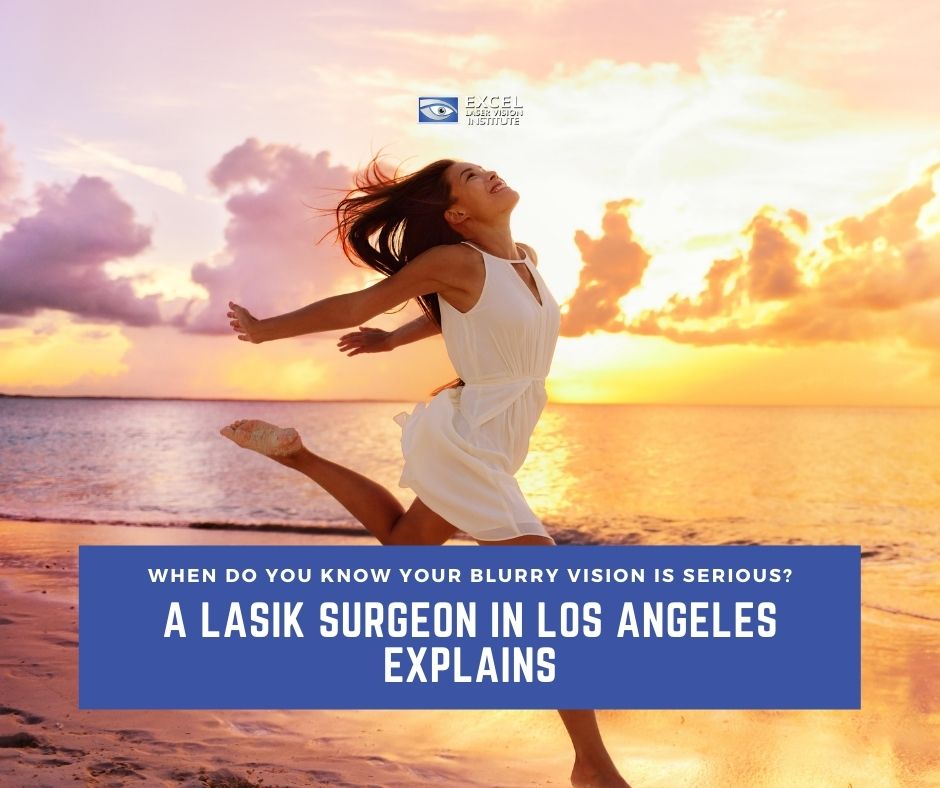
Many corrective eye surgery physicians will tell you to always look into what is causing your blurry vision. Sometimes understanding the reason behind your fuzzy vision could mean the difference to your overall perfect vision.
Here are a few instances when blurry vision may be a symptom of a serious eye problem.
Eye conditions and diseases
If you suddenly experience blurry vision in one eye and are over the age of 60, you could have developed a macular hole in the central zone of your retina.
Unexpected blurry vision may also signify a detached retina, eye herpes, or optic neuritis (optic nerve inflammation).
Specific eye conditions and diseases can result in permanent loss of vision, so it is vital that you see a LASIK surgeon in Los Angeles like Doctor Moosa for diagnosis and treatment if you experience out-of-the-blue blurriness.
Cataracts
You may have cataracts if you are starting to notice vision changes such as blurred or cloudy vision and glare or halos around lights at night. If cataracts are left untreated, they can eventually worsen and obstruct vision to the stage of blindness. However, if you undergo cataract surgery, it will restore your lost vision.
Glaucoma
If you are experiencing blurry vision or “tunnel vision,” this could be the first symptom of glaucoma. Without treatment, vision loss will worsen and permanent blindness can follow.
Age-related macular degeneration
Blurry vision and visual distortions can make straight lines look wavy or broken, which are symptoms of age-related macular degeneration (AMD), a prominent cause of blindness among older people.
Diabetic retinopathy
If you suffer from diabetes, unexplained blurred vision may be because of the onset of diabetic retinopathy, which is a sight-threatening disease that damages the retina of the eye.
Cardiovascular disease and other systemic diseases
Blurred vision, often when it is associated with double vision, can be a symptom of an underlying health emergency such as a stroke or brain hemorrhage. Additionally, it could be an early sign of multiple sclerosis. If you have sudden blurry or double vision, visit an eye doctor immediately.
You have a concussion
If you have recently banged your head severely and are now experiencing vision issues, you may suffer from a head injury. Concussions can result in blurry vision and many other visual changes such as double vision, difficulties with shifting gaze shifting from one point to another, problems focusing, and loss of binocular vision, otherwise known as eye alignment. If you believe you are suffering from a concussion, you should talk to your doctor immediately.
You are stressed out
Stress and anxiety can greatly affect your health in various ways, and that includes your vision. Not many people know how stress can deteriorate their vision and eye health. Sometimes stress can cause the pupils to dilate needlessly, and adrenaline can escalate pressure on the eyes.
Even though the long-term impact of stress on the eyes can vary, most mild discomfort can be dealt with by just naturally lowering your stress level. Nevertheless, continuous heightened stress levels can cause permanent vision loss. Therefore, to prevent stress-related vision issues, you should try to maintain a healthy lifestyle, take frequent visual breaks from screens and technology, and practice other stress-reducing activities such as meditation and exercise.
You have a rare condition called uveitis
If you are experiencing eye blurriness and dryness that is accompanied by inflammation in or around the eye, then you could be suffering from uveitis, a group of diseases that can be linked with auto-immune or infectious disease; however, it is usually restricted to just the eye.
The number of people with uveitis is very low, but the damage it can cause is very severe. Symptoms can vary depending on what part of the eye is affected. For instance, if there is inflammation in the front part of the eye, there is usually redness, light sensitivity, and pain, while inflammation in the back part of the eye presents floaters, fuzzy vision, and flashing lights.
Stroke
You could have blurry or lost vision in both eyes after having a stroke that has affected the part of the brain that controls vision. A stroke that involves your eye causes blurred or lost vision in only one eye.
Other symptoms accompany a stroke, such as weakness on one side of the body or the inability to communicate.
Transient ischemic attack
A transient ischemic attack (TIA) is a stroke that lasts less than 24 hours. One of its symptoms can sometimes be blurred vision in one or both eyes.
Wet macular degeneration
In the middle of your retina, you have something that is called the macula. When abnormal vessels grow, it can result in blood and other fluids leaking into the macula. This is known as wet macular degeneration.
It results in blurriness and vision loss in the center part of a person’s visual field. This is very different to dry macular degeneration since this type can start suddenly and progress very quickly.
On the flip side, if you have mild blurry vision that comes and goes, this could just mean you are overworked, have eye strain, or you are over-exposed to sunlight.
Nonetheless, sudden or continual changes in vision such as blurriness, double vision, tunnel vision, blind spots, halos, or dimness of vision could be symptoms of serious eye disease or other health issues, according to Doctor Moosa, a LASIK expert in Los Angeles.
If you have unexpected changes to your vision, you should always see your eye doctor for laser vision correction as soon as possible.
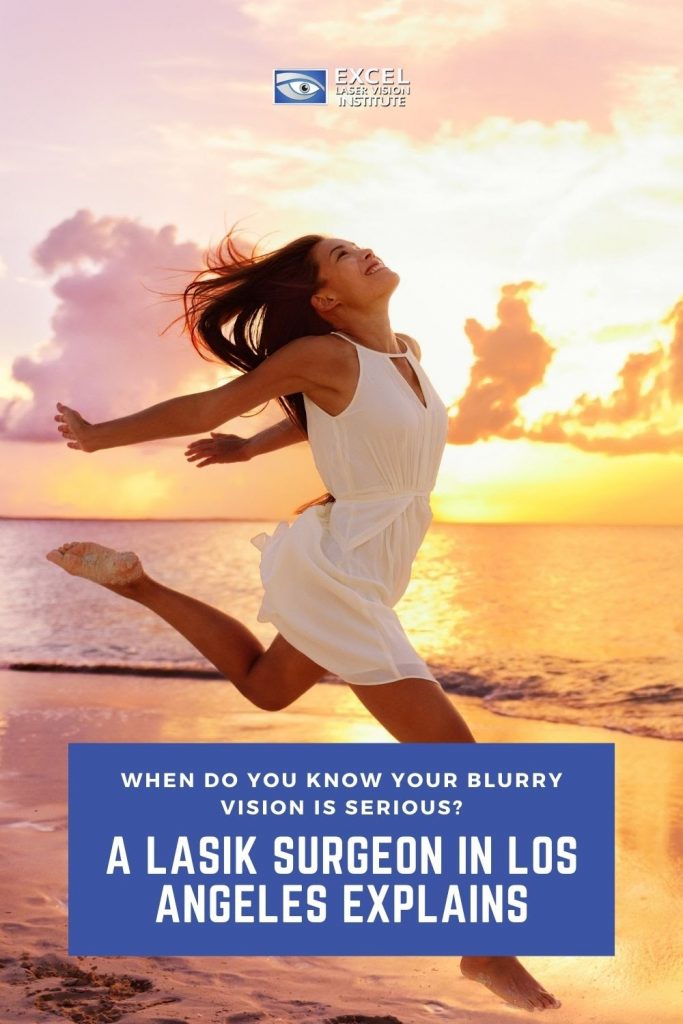
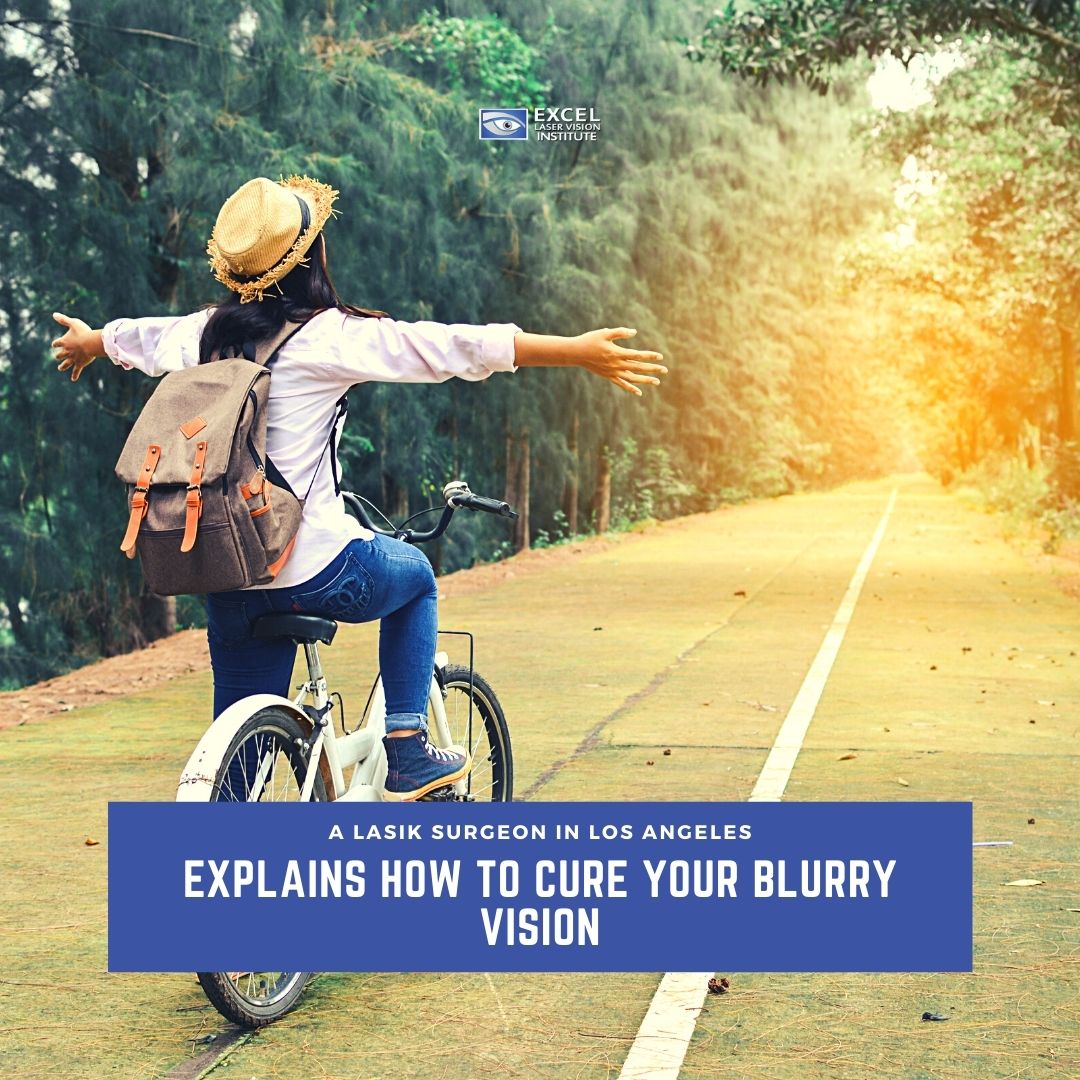
How To Cure Your Blurry Vision
The LASIK surgeons in Los Angeles explain the blurry vision to us as a loss of sharpness of eyesight that makes objects look out of focus and hazy.
The main causes of blurred vision are refractive errors such as nearsightedness, farsightedness, and astigmatism or presbyopia. However, there have been patients who come for laser eye surgery complaining about a blurry vision that could be one of the first symptoms of something more serious, such as potentially sight-threatening eye disease or neurological disorder.
Plus, blurred vision can affect both eyes, however, some individuals experience blurry vision in one eye only.
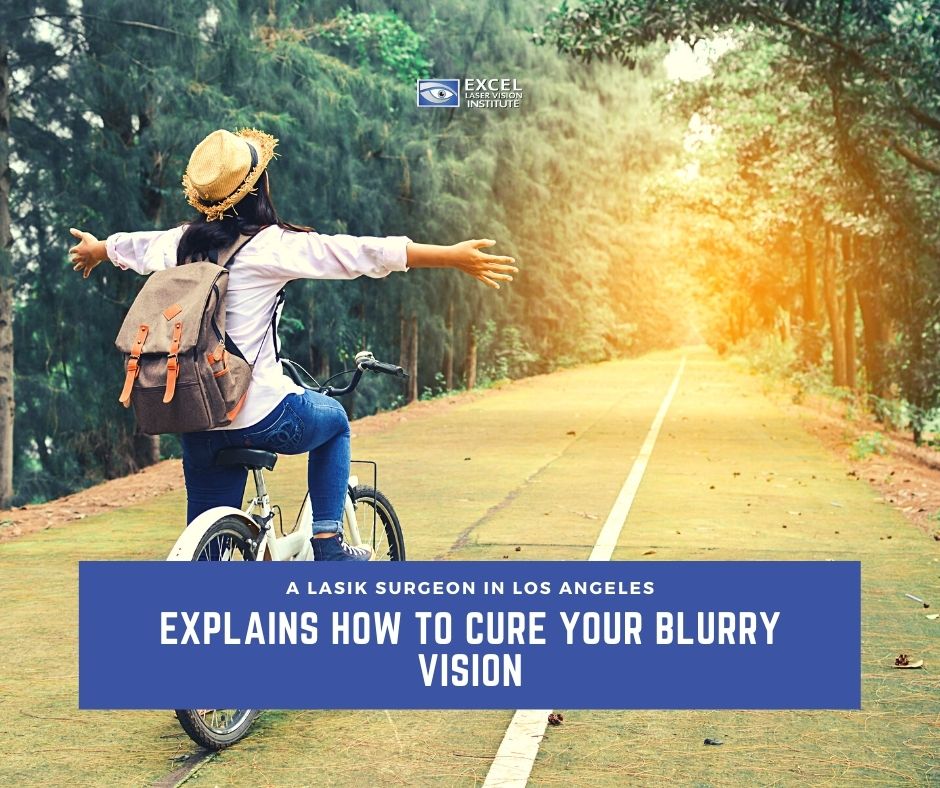
LASIK eye center doctors explain cloudy vision – when you see objects as obscured and appear “milky,” is equivalent to blurry vision. Normally, cloudy vision is a symptom of particular conditions such as cataracts. Both blurry vision and cloudy vision are symptoms of a serious eye problem, especially if they happen suddenly.
LASIK experts in Los Angeles recommend that the best way to find out if you have blurry vision and what is causing it is to visit an eye doctor for a comprehensive eye exam.
Blurry Vision: What Are The Causes And Treatments?
Myopia: Myopia, or nearsightedness, has various symptoms which include squinting, eye strain, headaches, and blurry vision in one or both eyes. Myopia is the most common refractive error and leads to a person seeing distant objects in a blurred manner.
Eyeglasses, contact lenses, and refractive surgery such as LASIK and PRK are the most common ways to correct nearsightedness.
Hyperopia: Hyperopia, or farsightedness, allows people to see distant objects clearly but their eyes can’t focus properly on close-up objects. If they try to, it causes unusual eye strain and fatigue. Also, when an individual suffers from severe farsightedness, even distant objects may appear blurred.
Similar to myopia, hyperopia can be corrected with eyeglasses, contact lenses, or refractive eye surgery.
Astigmatism: This is when a person experiences blurred vision at all distances. It is a type of refractive error, and it is usually caused by an irregularly shaped cornea.
With astigmatism, light rays fail to come to a single focus point on the retina to create a clear vision, no matter how far away the viewed object is from your eyes.
Astigmatism, similar to nearsightedness and farsightedness, can be corrected with eyeglasses, contact lenses, or refractive surgery.
Presbyopia: If you’re over the age of 40 and are beginning to notice blurry vision up close especially when reading a text message, a restaurant menu, food label, or other small print, for instance — most likely this is because there is the onset of presbyopia, a normal age-related vision problem.
While the symptoms of presbyopia are very similar to those that cause hyperopia (blurry near vision; eye strain when reading), presbyopia is an age-related loss of ability to focus on near objects because of the hardening of the lens inside the eye.
Normally, your optometrist will provide you with the most common treatments for presbyopia which include progressive lenses, bifocals, and reading glasses. If that isn’t suitable for you, there are also presbyopia surgery options such as corneal inlays, monovision LASIK, and conductive keratoplasty.
When you select eyeglasses to correct refractive errors and presbyopia, clarity and comfort can be improved with an anti-reflective coating and photochromic lenses. Make sure to ask your optician for more details.
Chronic dry eyes: Dry eye syndrome can affect your eyes in various ways, including causing variable blurry vision. Although artificial tears (lubricating eye drops) can help, more advanced cases of dry eye may need a prescription medication or punctal plugs to keep your eyes comfortable, healthy, and seeing properly.
Pregnancy: Blurry vision is not uncommon during pregnancy and sometimes pregnant women also experience double vision (diplopia). Hormonal changes can change the shape and thickness of your cornea, causing your vision to blur. Dry eyes also are normal to see in pregnant women and can cause blurred vision.
If you have any vision disturbances during your pregnancy, you should always let your doctor know. Although blurry vision is no always serious, in some instances it could be a sign of gestational diabetes or high blood pressure.
Ocular migraines or migraine headaches: Even though for the most part blurred vision, flickering light, halos, or zigzag patterns are harmless and temporary, they are all common symptoms before the beginning of an ocular migraine or migraine headache.
Eye floaters: Vision can be blurred by temporary spots or floaters that aimlessly move in your field of vision. Floaters usually appear when the eye’s gel-like vitreous starts to liquefy with age, resulting in microscopic bits of tissue within the vitreous to drift around freely inside the eye, casting shadows on the retina.
If you see an abrupt onset of floaters, this could be a sign of a torn or detached retina and you should see an eye doctor immediately.
Blurry vision after LASIK: Your vision may be blurry or hazy right after LASIK or any other type of refractive surgery. The clarity of your eyesight normally improves within a few days, but it may take more time for your vision to stabilize completely.
Eye drops and medication: Particularly eye drops — especially eye drops that contain preservatives — can cause irritation and blurry vision.
Additionally, some medications such as allergy pills can cause side effects of dry eyes and blurred vision. During a comprehensive eye exam, your eye doctor can advise you whether any of your medications may be the culprit to your blurry vision.
Over-wearing contact lenses: Wearing disposable contact lenses (or any type of contacts) for longer than your doctor recommends will cause proteins and other debris in your tear film to accumulate on the lenses. This can cause blurry vision and increase your risk of eye infections.
When you experience blurry vision that lasts for a long time or is very frequent, it is always advisable that you speak to a LASIK expert in Los Angeles like Doctor Moosa of Excel Laser Vision Institute immediately to rule out any serious vision problems.
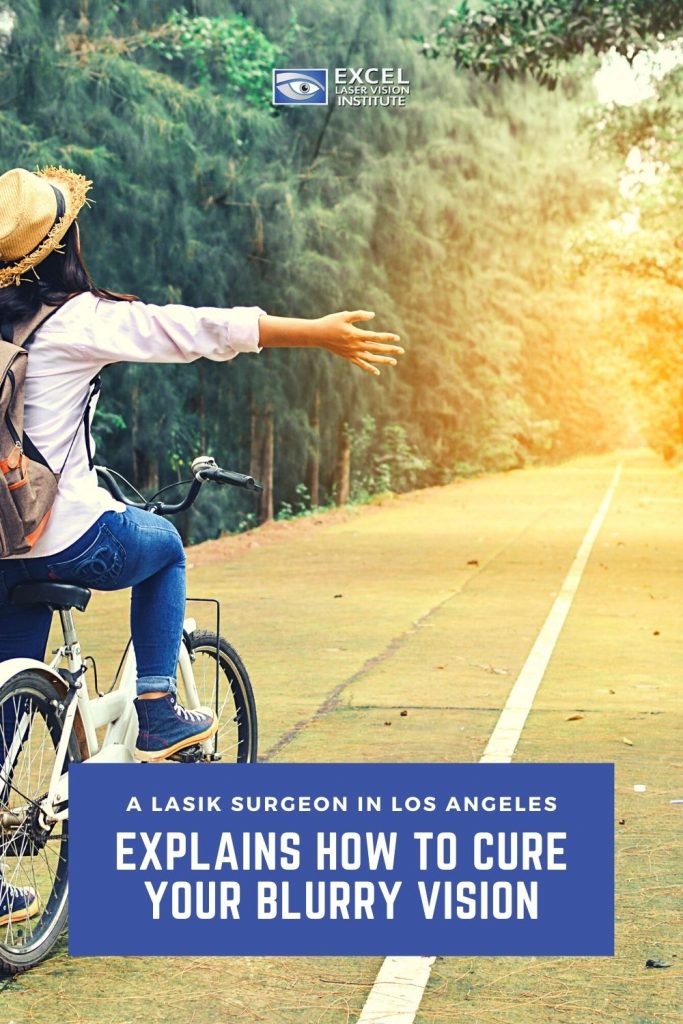
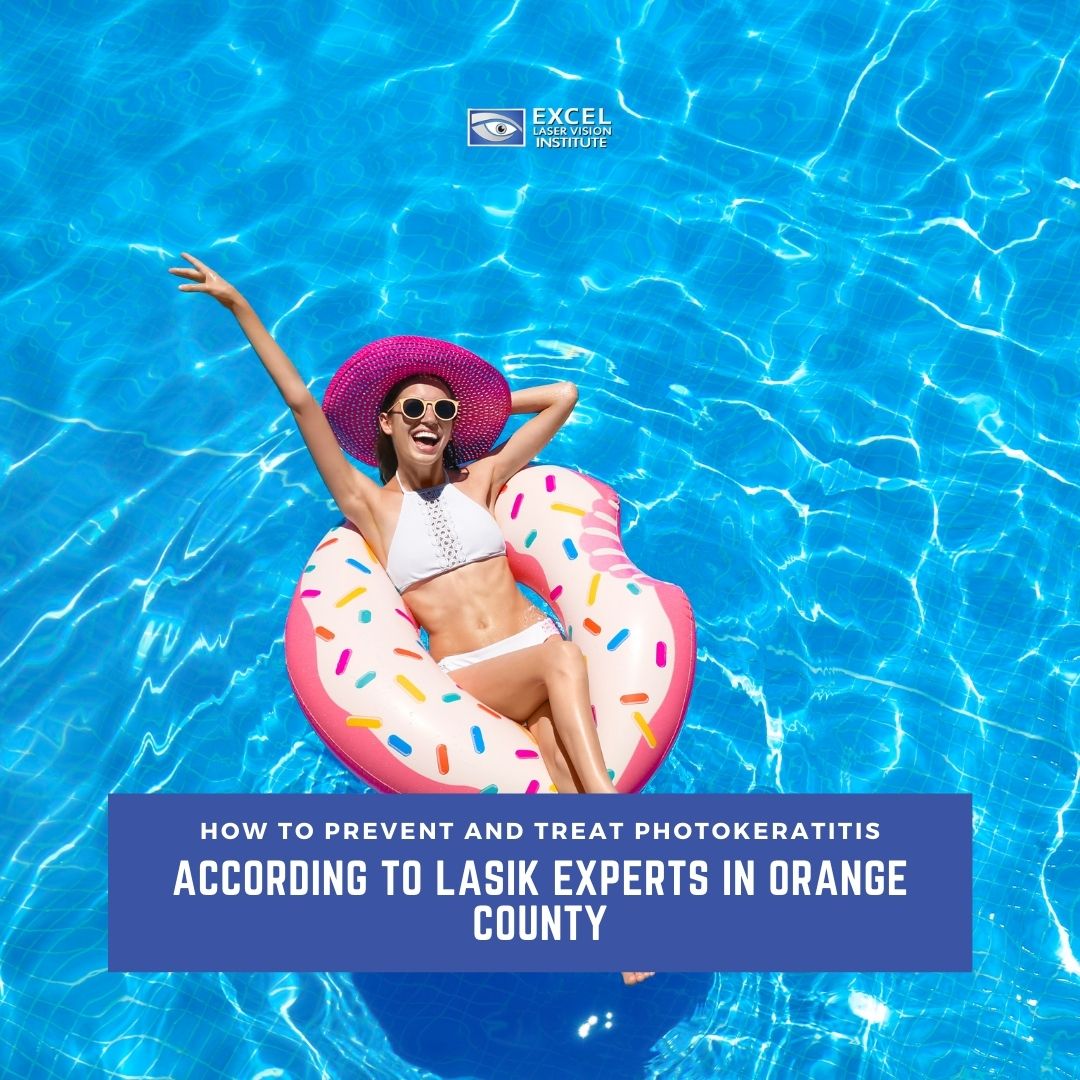
How to Prevent and Treat Photokeratitis
According to Doctor Moosa, one of the LASIK experts in Orange County, photokeratitis is like a sunburn for your eyes. While typically caused by UV exposure, this condition can also be produced with artificial light from tanning beds, halogen desk lamps, arc welding equipment, and laser lights. People can also develop photokeratitis from light reflected on snow and ice at high elevations. During photokeratitis, natural or artificial light damages the cornea and conjunctiva, which can cause vision problems and discomfort.

Even after receiving the best laser eye surgery in Orange County, people can still experience photokeratitis from sunlight exposure. That is why it is so important to protect your eyes with UV-blocking glasses. Here are some of the most common symptoms of photokeratitis to watch out for:
- Headaches
- Halos
- Blurred vision
- Swelling eyes
- Twitching eyes
- Light sensitivity
- Color changes
- Red, watery eyes
- Temporary vision loss
Symptoms of photokeratitis typically set in within six to twelve hours of exposure. However, there are some cases in which it takes as little as an hour. Symptoms can last for up to forty-eight hours. LASIK professionals in Orange County particularly those at Excel Laser Vision Institute say that the severity of the symptoms will depend on the length of exposure. However, even minor symptoms can increase a person’s chances of developing serious conditions like macular degeneration or cataracts in the future.
Whether you have had LASIK eye surgery or not, photokeratitis is a serious condition that must be prevented. The best way to protect your eyes from harmful UV rays is to purchase a pair of sunglasses that block 100% of UV rays. Sunglasses should be worn on any outdoor occasion since UV rays can still shine through even on a cloudy day. Sunlight can also reflect from surfaces such as water or snow, which is why it is so important to have the right protective lenses with you when spending time outside. Wide-brimmed hats and visors can also protect you from UV light.
Photokeratitis can also happen in the workplace. If you are exposed to UV radiation on the job, then it is imperative to wear goggles, face shields, or safety glasses to protect yourself. Do your research and discuss employee safety with your employer to see what equipment is already provided. Some people may consider getting UV absorbing contacts which block harmful light from reaching the eyes.
Treatment for photokeratitis depends on the severity of the condition. If you are experiencing any of the symptoms, then it is advisable to go inside and turn off any lights. Avoid rubbing your eyes or irritating them in any other way. Eyecare experts suggest using a cold compress to relieve any discomfort. Additionally, people may try artificial tears or ibuprofen to ease any painful symptoms. Keep track of your symptoms and note when they flare-up. If they do not subside in more than two days, then it may be necessary to visit an ophthalmologist. In most cases, using protective gear such as sunglasses and hats will help reduce any immediate symptoms. Speak to your eye doctor about photokeratitis to learn more.
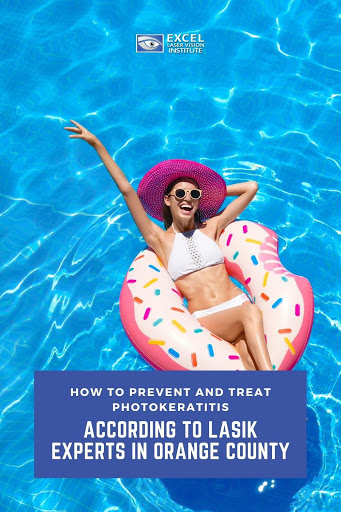
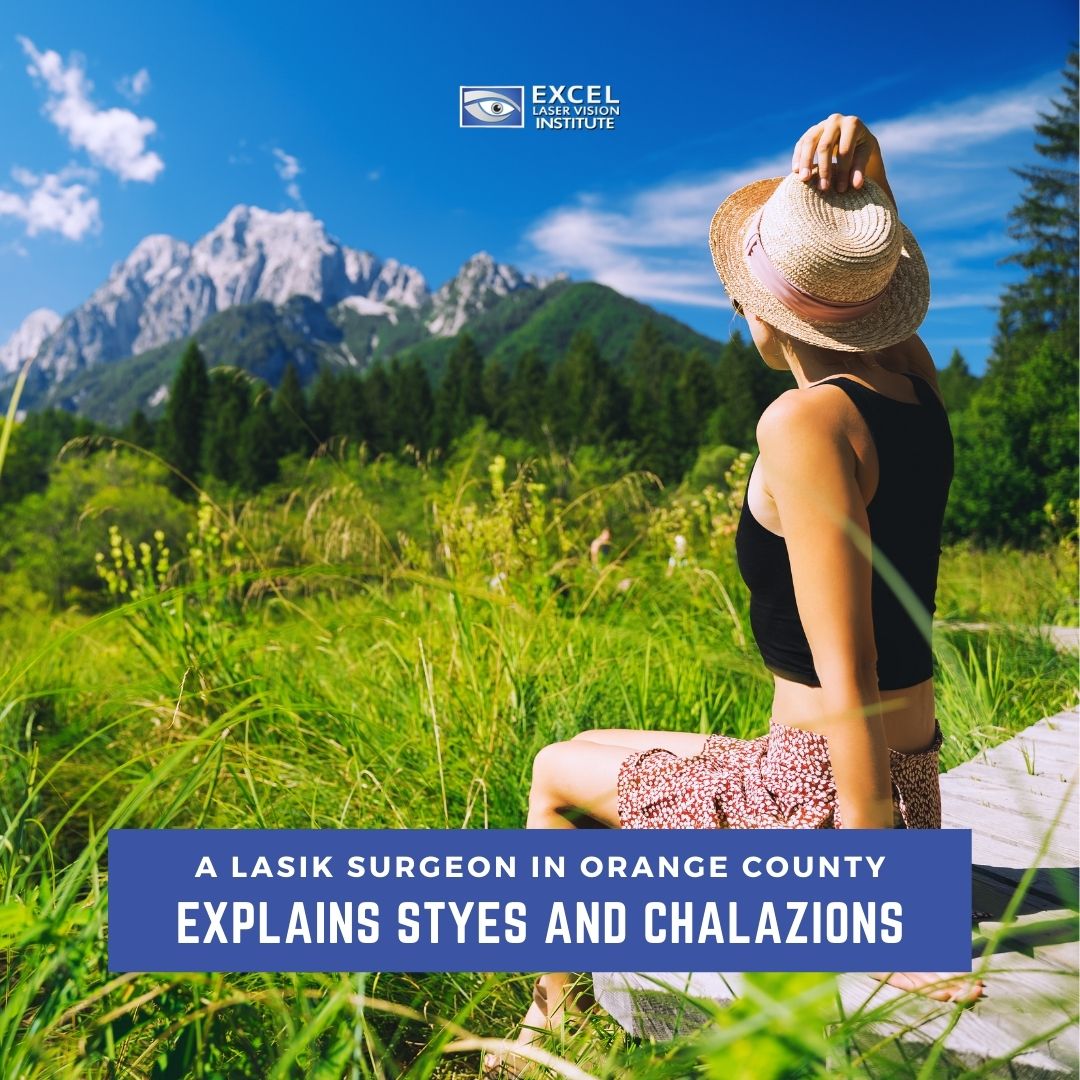
A LASIK Surgeon in Orange County Explains Styes and Chalazion
Eyelid bumps can be unsettling to find, especially if you have never experienced one before. LASIK experts in Orange County say that a painful bump on the eyelid could be classified as a stye. If it is painless, then it may be a chalazion. Here, we will delve into the difference between these two and what you can do if you find one.
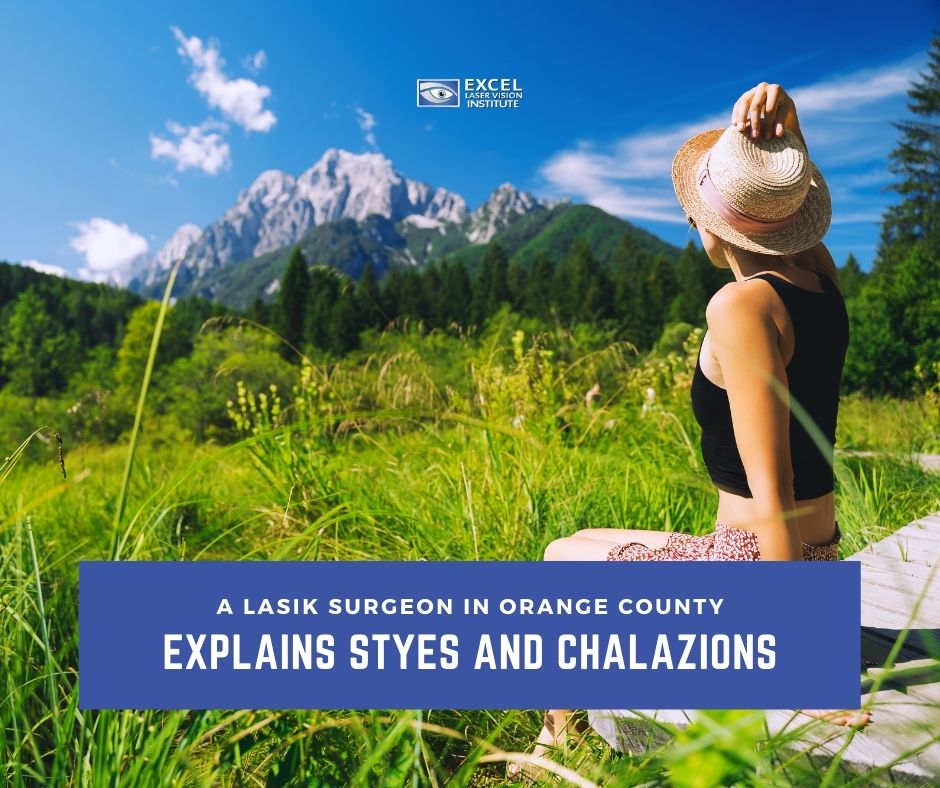
A stye is a localized bacterial infection that can develop within a blocked oil-producing gland or in a follicle at the base of an eyelash. When fully developed, styes are a painful white or yellow bump that resemble a tiny eyelid pimple. Fortunately, many styes can heal on their own. Once the infection has cleared up, many styes will turn into a chalazion, which is painless.
Chalazion can also develop independently of styes when a meibomian gland becomes blocked. The meibomian glands are located in the eyelid and are responsible for secreting oil when we blink. This layer of protection prevents tears from evaporating too quickly, which causes dry eye. When a meibomian gland gets blocked, a painless chalazion can form. In some cases, they may grow so large as to obstruct vision.
According to Doctor Moosa, a LASIK surgeon in Orange County, many people who wear contacts are more susceptible to developing bacterial infections like a stye. When opting for laser eye surgery, patients eliminate one cause of irritation, which is contact lenses. Here are some of the other ways that people can develop a stye or chalazion:
- Blepharitis (also known as eyelid inflammation)
- Skin conditions (e.g. acne, rosacea, seborrhea)
- Viral conjunctivitis (also known as pink eye)
- Tuberculosis
Before receiving LASIK eye surgery in Orange County, an eye care professional will evaluate your eye health. Any infections or blocked meibomian glands will need time to heal. According to Doctor Moosa, a LASIK doctor in Orange County, styes typically take one to two weeks to heal. Chalazions can take up to a month to go away. You can speed up the process by keeping the area clean and trying some home remedies, according to the suggestions of your eye doctor. Here are some of the common ways to treat chalazions and styes:
- Use a warm compress – Many doctors recommend gently pressing a warm washcloth to your eye for five minutes in order to open up the skin’s pores and allow the eyelid pump to drain. You can try this several times a day to lessen the size of the bump.
- Use antibiotics or steroid drops – In some cases, a stye or chalazion may be incredibly inconvenient. If your eyelid bump is unusually large or painful, then your eye doctor may recommend the use of some prescribed drops or antibiotics.
- Keep your eyes clean – In order to avoid irritating a stye or chalazion more, do not rub your eye and always wash your hands before touching the area.
- Avoid squeezing the area – Unlike pimples, you cannot pop a chalazion or stye. Squeezing them could actually cause more complications. So, make sure you are treating the area according to your doctor’s wishes. You may be prescribed drops, oral pills, or ointments to help the area heal.
- Surgery – In the most extreme cases, a doctor may find it necessary to remove an eyelid bump via a simple surgery under local anesthesia. Make sure to discuss the procedure with your doctor so you have all the right information before you go in.
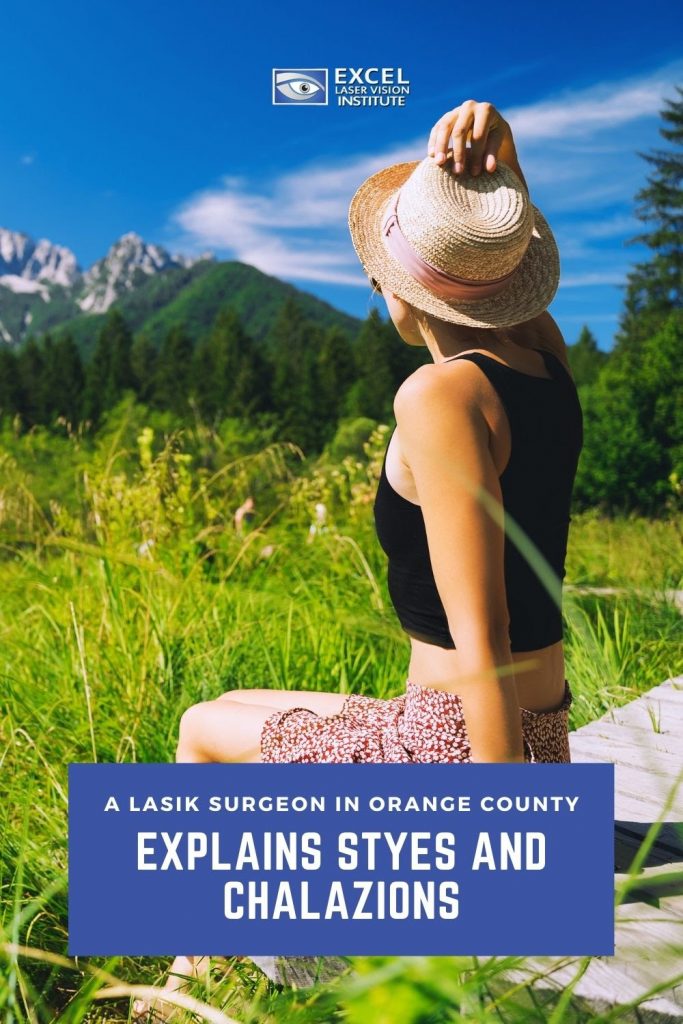
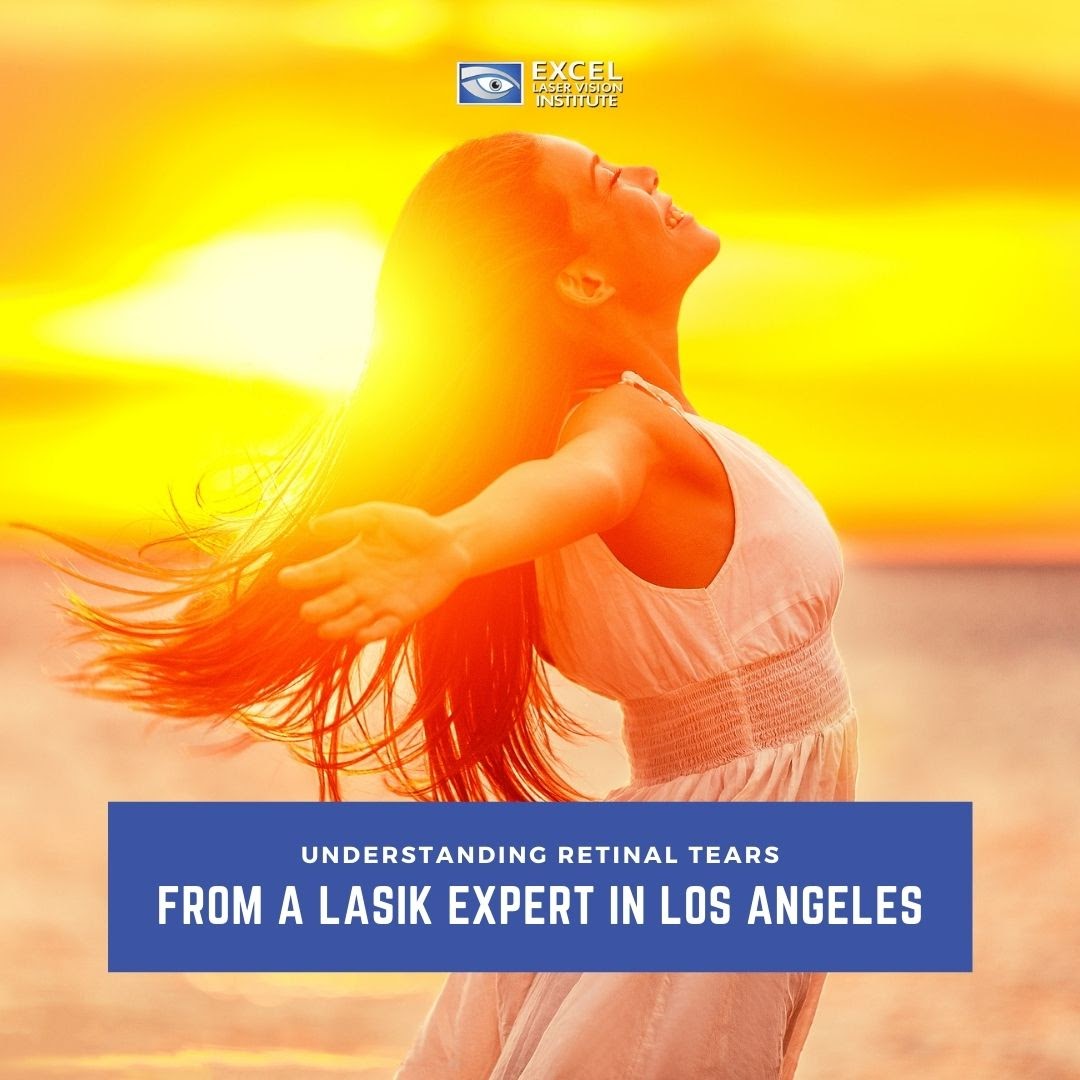
Understanding Retinal Tears from a LASIK Expert in Los Angeles
Our eyes are an amazing, sensitive, powerful system that needs to be protected. According to the LASIK experts in Los Angeles like those of Excel laser Vision Institute, there are certain eye conditions that people should always look out for. Whenever noticing something different with vision, it is important to consult your eye doctor and determine the severity of the issue. Retinal tears, for instance, pose a serious threat to eye health and visual acuity.
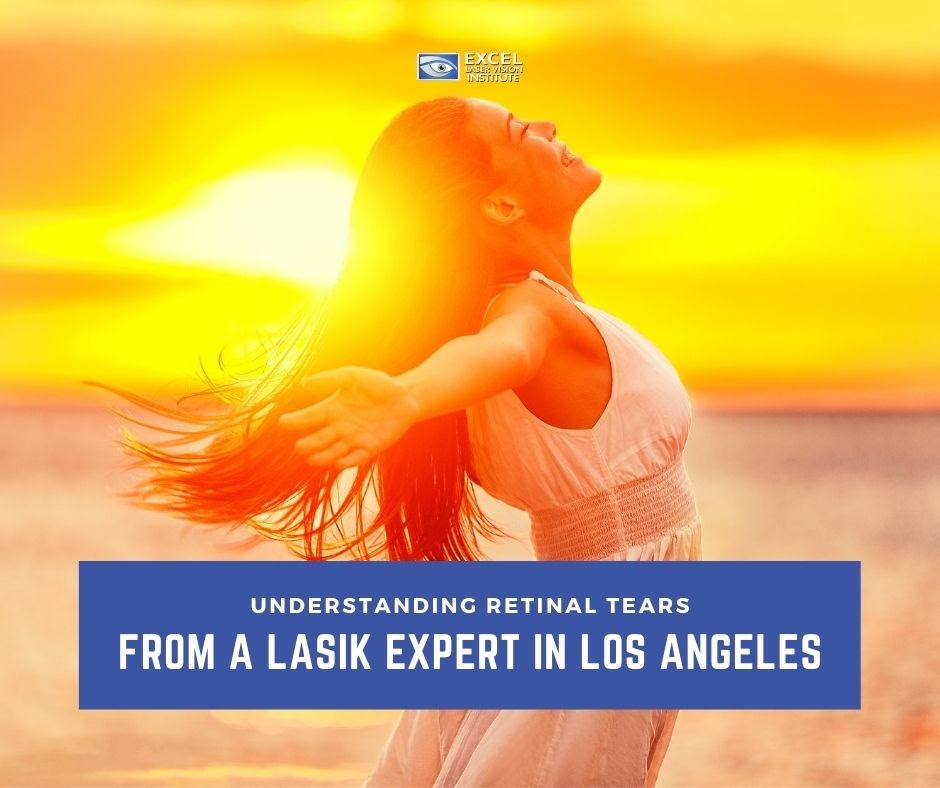
Doctor Moosa, one of the best LASIK surgeons in Los Angeles, describe the retina as a lining of tissue on the back of the eye that is very sensitive to light. This thin layer is made up of cells that translate light waves to electrical impulses which go to the brain. When light hits the retina, it travels through the optic nerve to the brain, where the images can be processed. The retina can be torn in many different circumstances: from an injury, from age, or nearsightedness. This tearing of the retina occurs when vitreous gel fills the eyeball and pulls at the retina, causing it to separate from the inner wall. Retina tears can then become retinal detachment, which can ultimately lead to vision loss if it is not properly treated.
LASIK surgeons in Los Angeles are trained to avoid any retinal tearing during refractive surgery. However, there are cases in which other forms of eye surgery may result in some injury to the retina. Here are some of the signs of retinal tearing to look out for:
- Hazy vision
- Flashing lights
- Floaters, specks, dots, or cobwebs
- Vision loss
- Shadows or dark spots
Retinal tears can be treated on a case by case basis. Depending on the size and the severity of the injury, it may require different procedures. Smaller tears that do not affect central vision may be repaired with a retinal laser in a procedure known as laser photocoagulation. According to LASIK professionals in Los Angeles, laser technology has allowed for much improvement in eye care over the years, including this retinal procedure as well as refractive surgeries like LASIK, SMILE, and PRK surgery.
A more extreme treatment for retinal detachment is called vitrectomy. This surgery removes the vitreous gel and replaces the retina on the eyewall with a laser. Then, a gas bubble is placed in the eye to hold the retina still while it heals. Over time, the gas becomes absorbed by the eye and is replaced with a natural fluid. The full healing process can take several months and patients must avoid high altitudes. Patients who receive a vitrectomy may require cataract surgery in the future or another kind of eye surgery to restore vision.
Eye experts know that no two retinal tears are the same. That’s why it’s so hard to predict the exact timeframe of the healing process. Fortunately, many patients are able to recover most of their vision if they have the procedure done in a timely manner. If you are experiencing any of the signs of retinal tears or detachment, then please contact your eye doctor as soon as possible.
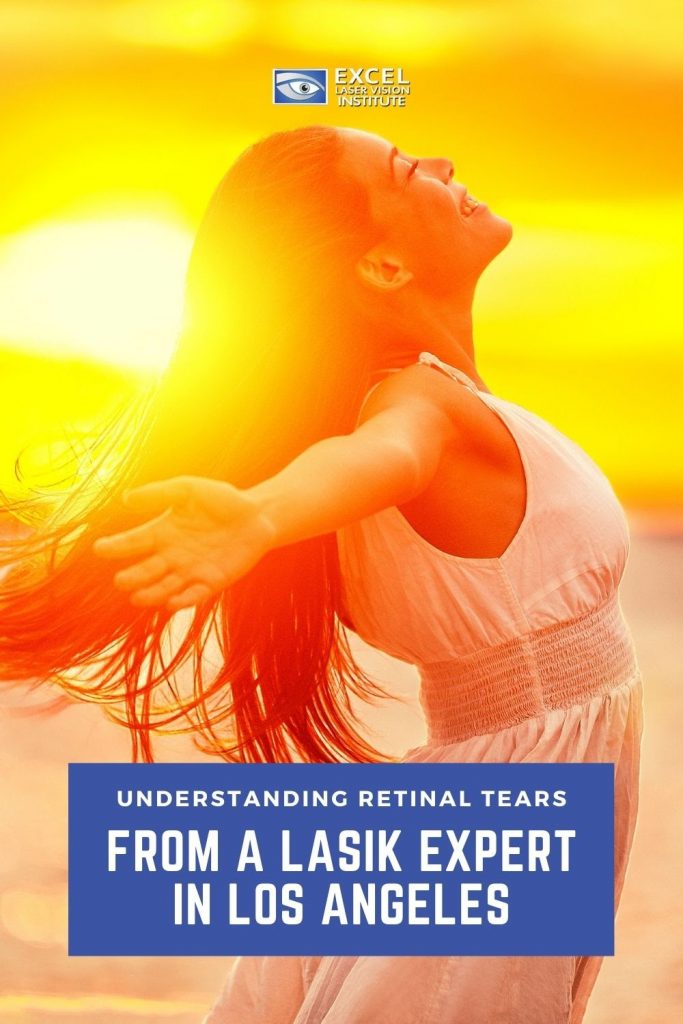
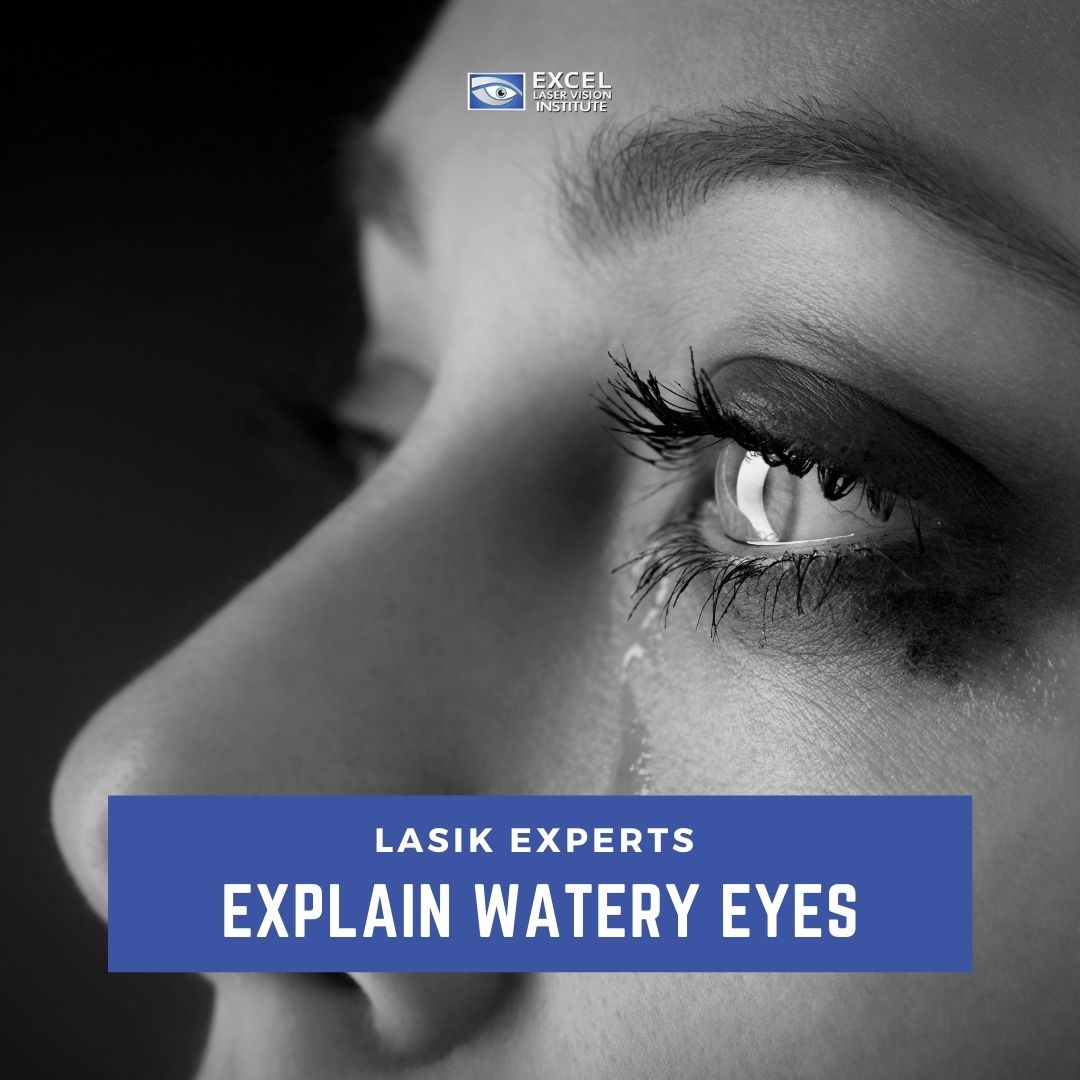
LASIK Experts Explain Watery Eyes
Every once in a while, some of us will experience watery eyes, whether we’re extra tired or laughing hysterically from a joke one of our friends told. This is normal. However, there are some cases in which watery eyes happen without an obvious reason. Eyecare experts from Excel Laser Vision Institute, a LASIK clinic in Los Angeles, are here to explain why we experience this phenomenon and what we can do to improve the condition.
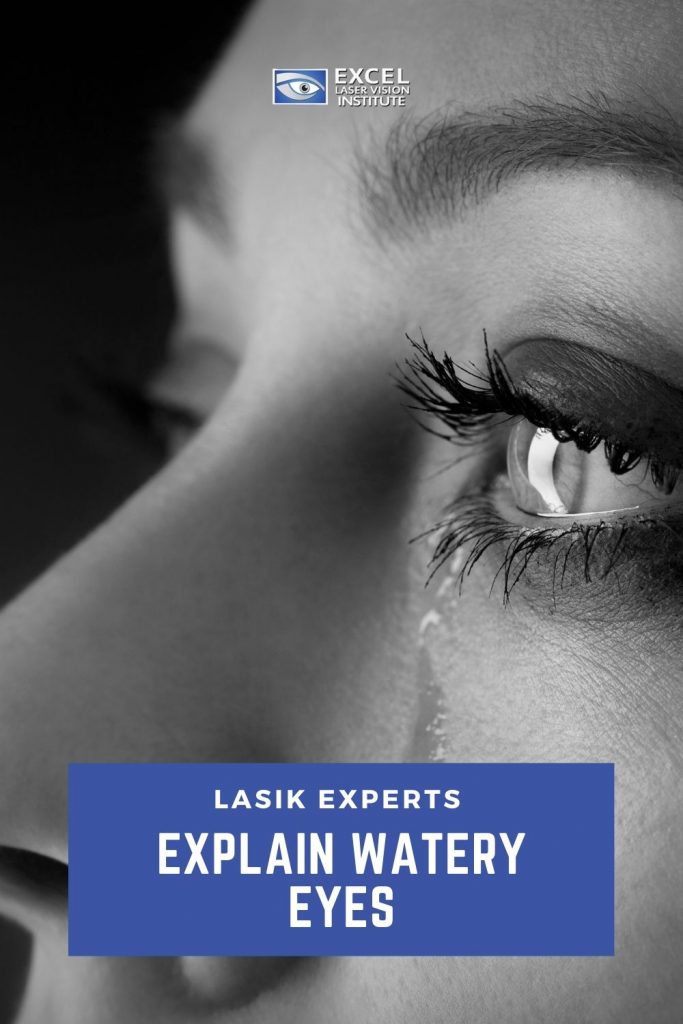
To understand watery eyes, we have to understand how our eye works. The tear glands are especially built to lubricate parts of our eye, like the cornea. This moisture protects the internal structure of the eye and helps filter light. Ultimately, our tear glands ensure that our vision is working properly and that the corneas do not dry out.
Tears are made up of water, fatty oils, and mucus. All three of these ingredients are necessary to coat the cornea, focus our eyes, and sharpen our vision. If our eyes are producing excessive tears, then this means that there is an imbalance within our glands; either producing too many tears or not sufficiently draining these tears (possibly as a result of blockage).
Here are some of the most common reasons for watery eyes:
A Dry Environment
Our eyes will naturally produce more tears as a reaction to a dry environment. Why is this? Well, think of it as an overcompensation. Many people find that using a humidifier can help regulate their tears as well as avoiding direct contact with fans.
Too Much Computer Time
When we’re looking at our phones, computers, and tablets, our eyes are hyper-focused. This can naturally reduce our blink rate, which may then lead to dry eyes. As a reaction to this, our eyes may begin reflex tearing. In order to avoid this, LASIK doctors, particularly Doctor Moosa, recommend taking breaks every 20 minutes to look at something off-screen or rest your eyes.
Contact Lenses
Wearing contacts for an extended period of time can actually cause tears to evaporate more quickly. As a response to this, our eyes will start to accelerate the production of tears. If you’re tired of dealing with this sensation, then you may want to look into getting corrective eye surgery so you can kiss your contacts goodbye.
Makeup Contamination
Eye makeup like mascara, eyeliner, and eye shadow can flake off into the eye and cause irritation. This may cause excessive watering in order to expel foreign objects. While this is not necessarily a bad thing, it can be inconvenient to deal with. Avoid practices like tightlining (applying eyeliner on the inside margin of eyelashes) and always remove makeup thoroughly each day.
Clogged Meibomian Glands
Our eyelids release an oil right along with the watermark which allows our eyes to stay lubricated. When these glands are blocked, it may cause our eyes to create an excess of tears. Eye doctors that perform laser vision correction commonly see this with pink eye, blepharitis, rosacea, and other inflammatory conditions.
Allergic Reaction
Those of us who suffer from allergies know that watery eyes come with the territory. When our bodies are exposed to an allergen, this can cause a release of histamines to combat the allergen. Watery eyes are just a way of our body fighting off irritants with histamine chemicals.
Chronic Dry Eye
While this may seem counterintuitive, dry eyes can actually cause watery eyes. For example, when a person is sleep-deprived, they may experience burning or stinging sensations in their eyes as well as blurred vision, light sensitivity, and eye fatigue. When this happens, our bodies want to go into defense mode. Watery eyes can be a result.
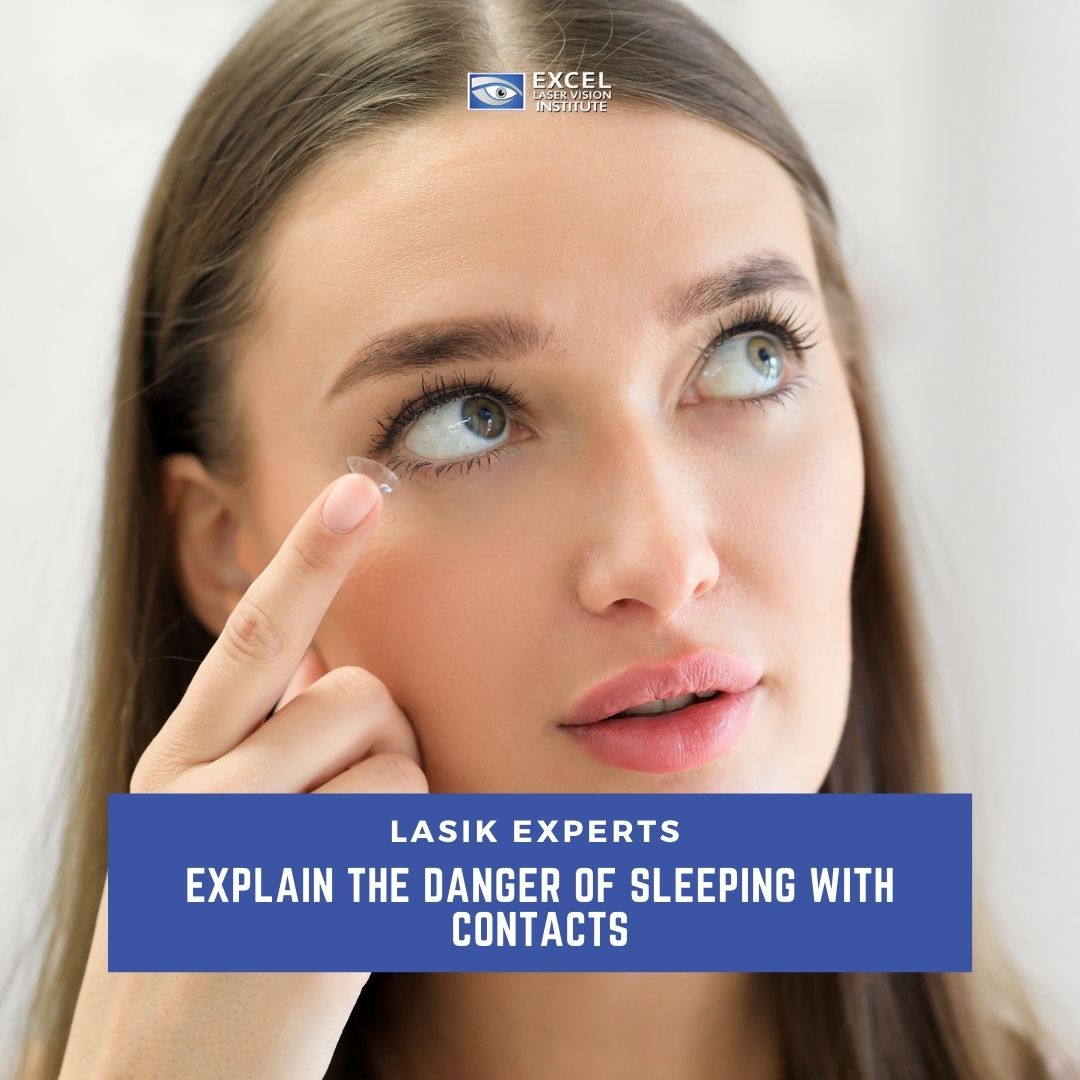
LASIK Experts Explain the Danger of Sleeping with Contacts
Wearing contacts is a responsibility. Like glasses, they can be expensive to obtain. Then, you have to make sure that they don’t get lost or damaged, are regularly cleaned, and are taken out when you go to sleep. Contacts are not for low-maintenance people. In fact, the inconvenience of contact lenses is what pushes many people to look into LASIK eye surgery. LASIK experts like Doctor Moosa say that wearing contacts actually increases your risk of developing harmful eye conditions, especially when forgetting to take them out at night. Below, we will delve into the science of sleeping with contacts and some helpful tips for those who are using these corrective lenses for the time being.
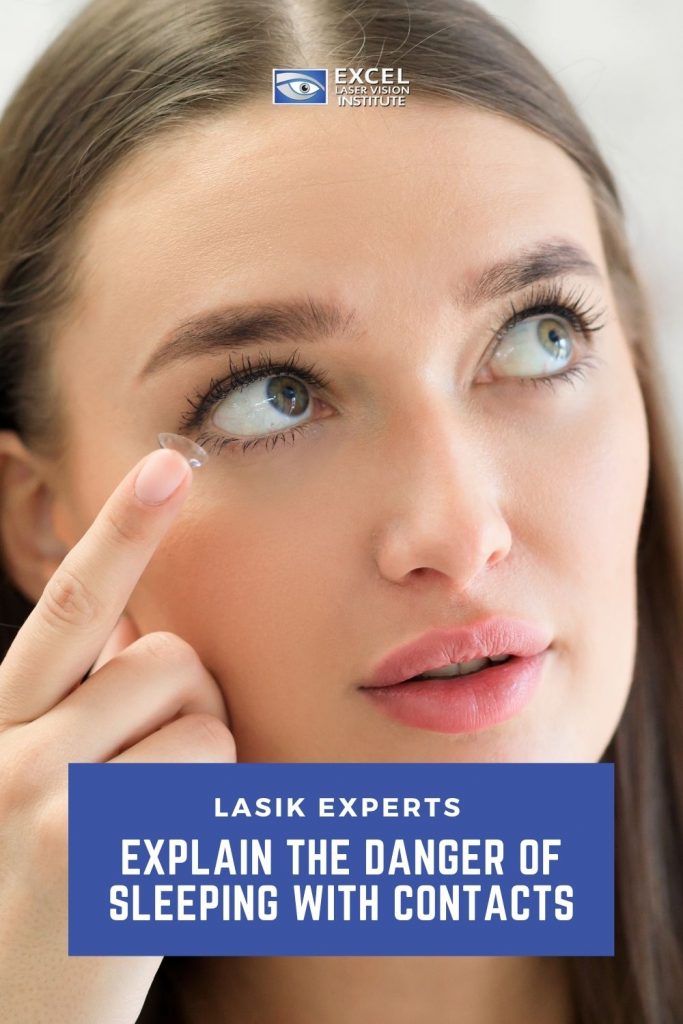
Oxygen Restriction
Our eyes, like other parts of our body, require oxygen to function. When they are open, they can receive a necessary supply from the air around us. However, contact lenses can block this process from happening. This means that contact users have a greater chance of developing inflammation, redness, irritation, fungal infections, bacterial infections, and corneal ulcers. This risk increases when contact users go to sleep without giving their eyes a break. Closed eyes will already receive less oxygen and, coupled with the barrier of contacts, this can cause serious issues and may even lead to impaired vision.
Pink Eye
Dr. Moosa, a Harvard-trained surgeon at a LASIK eye center in Los Angeles, Excel Laser Vision Institute, says that pink eye is a common problem amongst contact users. Anyone who falls asleep with their contacts on has a chance of developing conjunctivitis or another type of eye infection. Why is this? Studies have shown that our corneas are more susceptible to microscopic tears when wearing contacts for an extended period with our eyes closed. These mini tears can introduce fungi and bacteria into the eye.
Eye Ulcer
If you’re wondering why so many people are trading in their contacts for laser eye surgery, then let us introduce to you, corneal ulcers. Another risk of sleeping with contacts is developing an ulcer in your eye. This condition is actually one of the leading causes of blindness. Corneal ulcers are microscopic open wounds that festers when blocked from oxygen. If ulcers are not treated in a timely manner, they can cause lifelong damage to a patient’s vision.
Red Eye
Contact Lens Acute Red Eye (CLARE), otherwise known as Tight Lens Syndrome or Contact Lens Overwear Syndrome, is a common condition that people experience when they sleep with contacts. Symptoms of this include redness, tearing, decreased vision, and light sensitivity. If this condition persists, contact users may experience worse symptoms and potentially suffer vision loss.
Preventing Contact-Related Infections
The best way to prevent infections from contacts is to opt for another eye correction solution. LASIK, PRK, SMILE, and other refractive surgeries can help many people achieve 20/20 vision without the need of contacts or glasses. So, if you’re interested in replacing your contact lenses with clear, independent vision, then get LASIK from Excel Laser Vision Institute. Until then, here are some helpful tips for contact users:
- Avoid rubbing your eyes
- Always wash your hands before inserting or removing contacts
- Never reuse disposable contacts
- Remove contacts before swimming
- Remove contacts before sleeping or napping
- Never share contacts with anyone else
- Avoid costume contacts
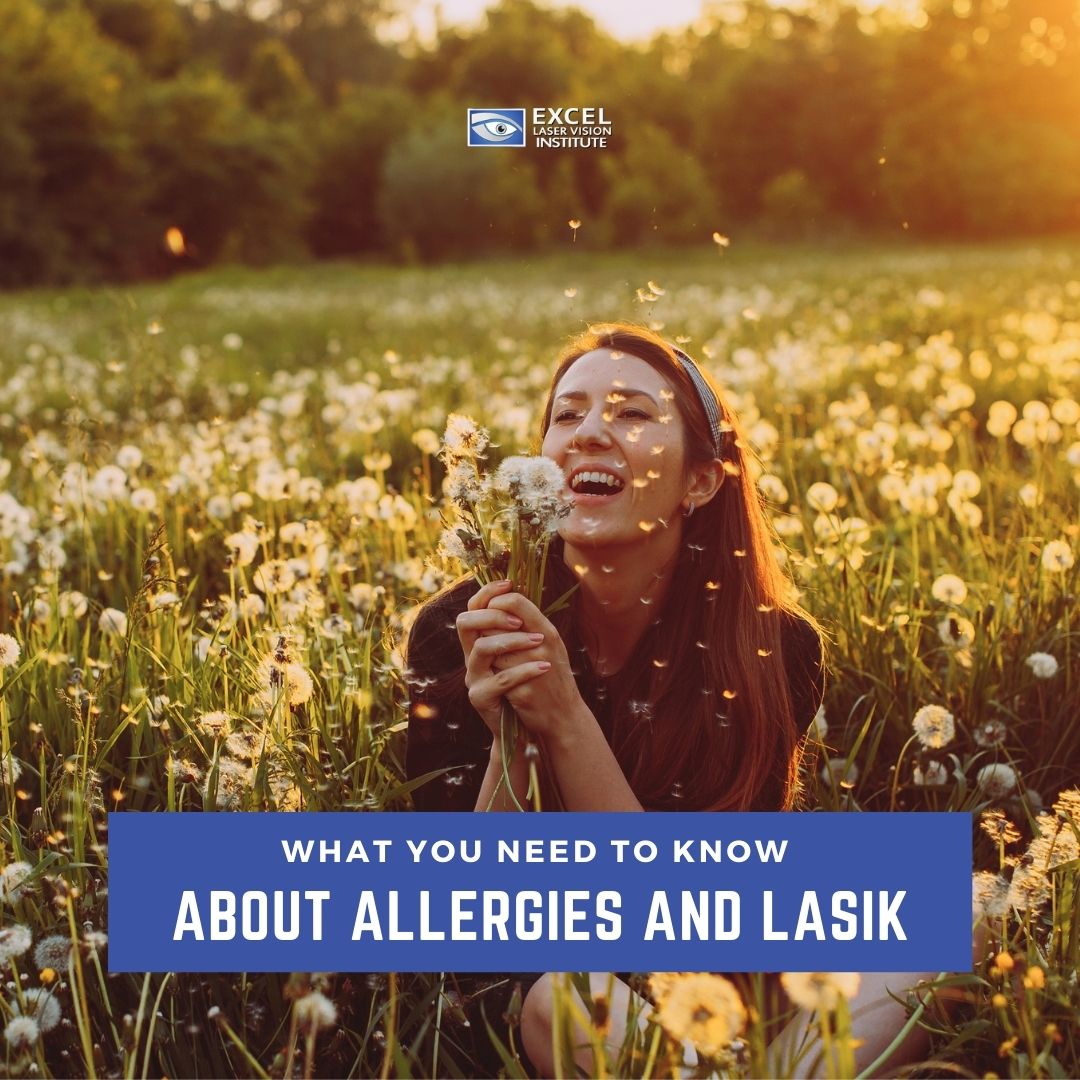
What You Need to Know About Allergies and LASIK
If you have allergies, then you know that our eyes can be very sensitive to things like pollen. Swelling, irritation, dryness and other uncomfortable symptoms can arise during allergy season. To make matters worse, those who rely on contact lenses may develop even worse symptoms when pollen, dirt, and dust attaches itself to the eye. For this reason, many people choose to get LASIK at Excel Laser Vision Institute in Orange County.

During allergy season, contacts are one of the worst options for vision correction. They can agitate sensitive eyes and become infected, causing conditions like pink eye. When spending time outdoors, contact lens wearers have to be wary of dander, pollen, and other particulate matter sticking to their lenses. This phenomenon typically happens during the spring and summer, but is not limited to allergy season. Throughout the year, people who wear contacts have to over prepare in order to prevent infections from developing and spreading. While these steps are necessary to promote ocular health, they can be exhausting. For some, it becomes too much work. That’s when people search for the best laser eye surgery in Orange County.
Contacts are too much work and glasses are too fragile, so where does that leave patients with myopia, hyperopia, and astigmatism? Fortunately, technology in the ocular field has dramatically improved over the last few decades. Laser technology has allowed eye care professionals to develop techniques such as PRK, SMILE, and LASIK eye surgery in Orange County. Now, patients can have their vision corrected to 20/20 or above!
When you visit a LASIK clinic such as excel Laser Vision Institute in Orange County today, you may find that they are booked many months in advance. That is because so many people are becoming aware of the gift that is laser eye surgery. Patients with allergies are finding some relief in their corrected vision, which allows them to go without contact lenses or glasses for a majority of their life.
If you have allergies and you’re interested in LASIK eye surgery, then the good news is that your allergies do not disqualify you for the procedure. In fact, many LASIK specialists recommend laser eye surgery for those who suffer from allergies. However, having allergies does not immediately qualify you for LASIK either. Here are some of the factors that determine LASIK candidacy:
- Prescription level (astigmatism, farsightedness, nearsightedness)
- Age 18 +
- Thickness of corneas
- State of ocular health
- Prescription stability
LASIK specialists recommend that you schedule your procedure at a time when your allergy symptoms are at their lowest. This will prevent any additional risk of inflammation or irritation during the surgery. Your LASIK doctor will evaluate your eyes first to determine if you are eligible for the procedure. Other than that, a recent study has shown that patients with allergies were no more prone to complications during their LASIK surgery than patients without allergies. Thus, the surgery is just as safe and just as effective. Speak to a LASIK surgeon today about laser eye surgery and learn how you can achieve your vision goals!
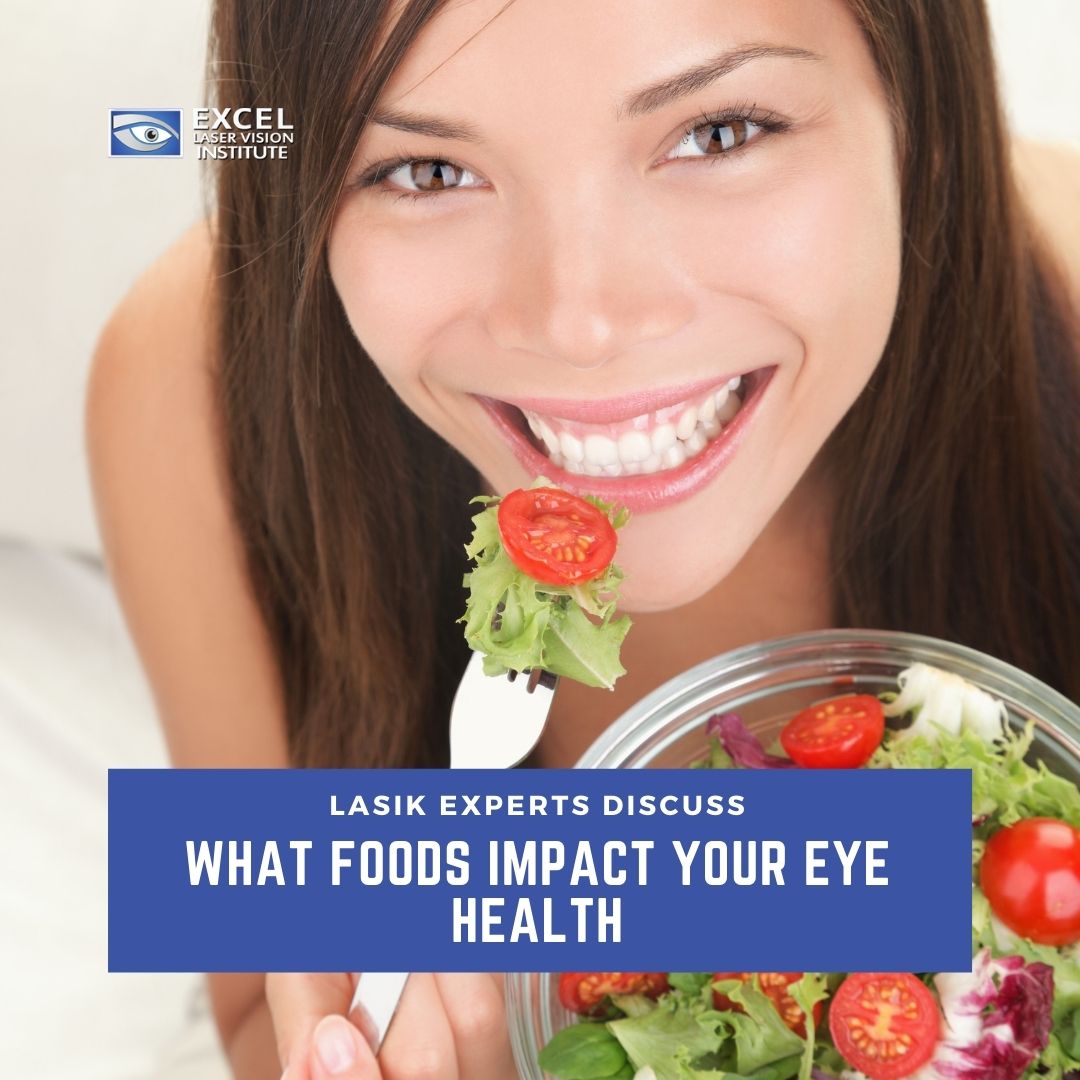
LASIK Experts Discuss What Foods Impact Your Eye Health
The food that we chose to put in our bodies can greatly affect how we feel. Why is this? Food is fuel. If we eat unhealthy meals, then we are giving ourselves bad fuel, which in turn can lead to health problems down the road. Conversely, good food can make our bodies operate at its highest capacity. According to Doctor Moosa, one of the top LASIK professionals in Los Angeles, there are many types of food that can impact our eye health in particular.

Here are some of the best foods to eat for ocular health:
Berries
The best LASIK surgeons in Los Angeles say that berries contain high levels of antioxidants and vitamin C! This means that they are a great food to incorporate in your diet for healthy eyes. Blackberries and raspberries are especially high in these nutrients. If you’re eager to add more fruit into your diet, then you may also want to try more grapefruit and oranges, which also offer vitamin C and antioxidants.
Corn
While sometimes debated for its health benefits, corn has actually been found to have high levels of lutein and zeaxanthin. These are macular pigments that act as a natural shield from harmful sun rays. With more lutein and zeaxanthin in your diet, you decrease your risk for developing eye problems like cataracts.
Eggs
LASIK surgeons in Los Angeles particularly Doctor Moosa vow by eggs for eye health. Why? While they provide lutein and zeaxanthin, the yolks also have high levels of zinc. By eating more eggs, you can help fight against macular degeneration. And, after all, breakfast is the most important meal of the day!
Leafy Greens
Brussel sprouts, broccoli, and kale…oh my! Green vegetables are great for your eyes. Whether it’s a handful of spinach in your smoothie or some chard in your sandwich, you can incorporate these veggies in many ways. Green vegetables are known for their high levels of lutein and zeaxanthin. The more vegetables you eat, the better chance you have for increasing your ocular health.
Legumes
If you ask a LASIK expert in Los Angeles how to help your retinal health, then they may recommend legumes! Everything from lentils to black-eyed peas to kidney beans contain bioflavonoids and zinc. These ingredients protect your retina, which can lower your chances for health problems in the future.
Salmon
The key to eye health is omega-3 fatty acids. There are a variety of food options that provide this, but salmon is at the top of the list. Salmon is a healthy and light protein that can provide those omega-3s, which protect your blood vessels.
Turkey
Last, but certainly not least, is turkey! If you’ve always been a fan of Thanksgiving, then you’ll be happy to hear that turkey has lots of zinc, niacin, and vitamin B! These ingredients can help protect your eyes from developing cataracts.
Conclusion
Now that you know what foods promote good eye health, you can tackle your next meal with confidence. Foods that are not conducive to ocular health include fried food, margarine, and sugary drinks. Swap out your unhealthy choices for something more nutritious and enjoy your healthy eyes.
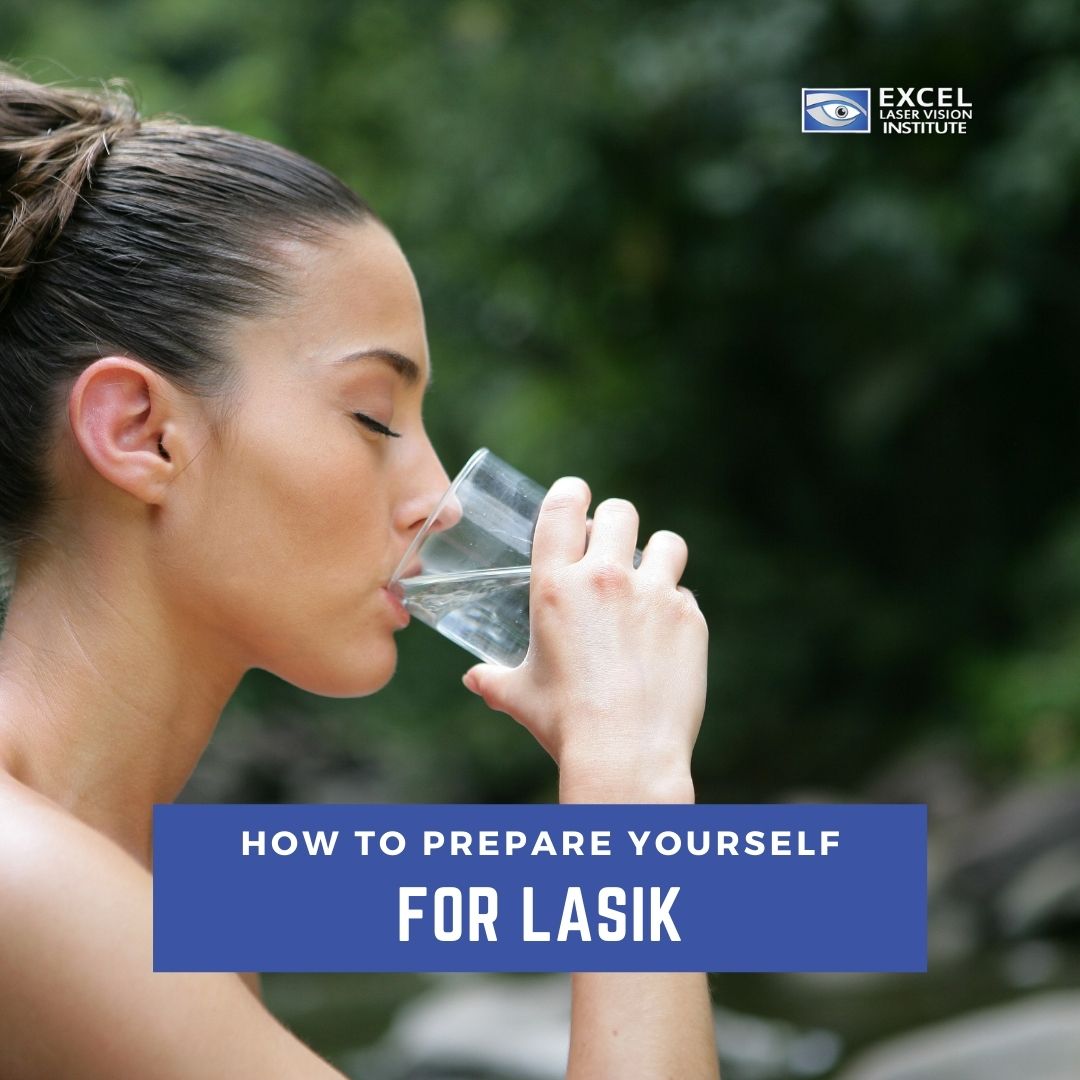
How to Prepare Yourself
If you have been selected as an eligible candidate for LASIK in Orange County, then congratulations! You are on the road to clear vision and a world of possibilities. With a distinguished LASIK surgeon in Orange County like Dr. Moosa, you will receive quality of care before, after, and during the procedure. In order to prepare for the day of the surgery, please be sure to follow your surgeon’s instructions and keep these general practices in mind:
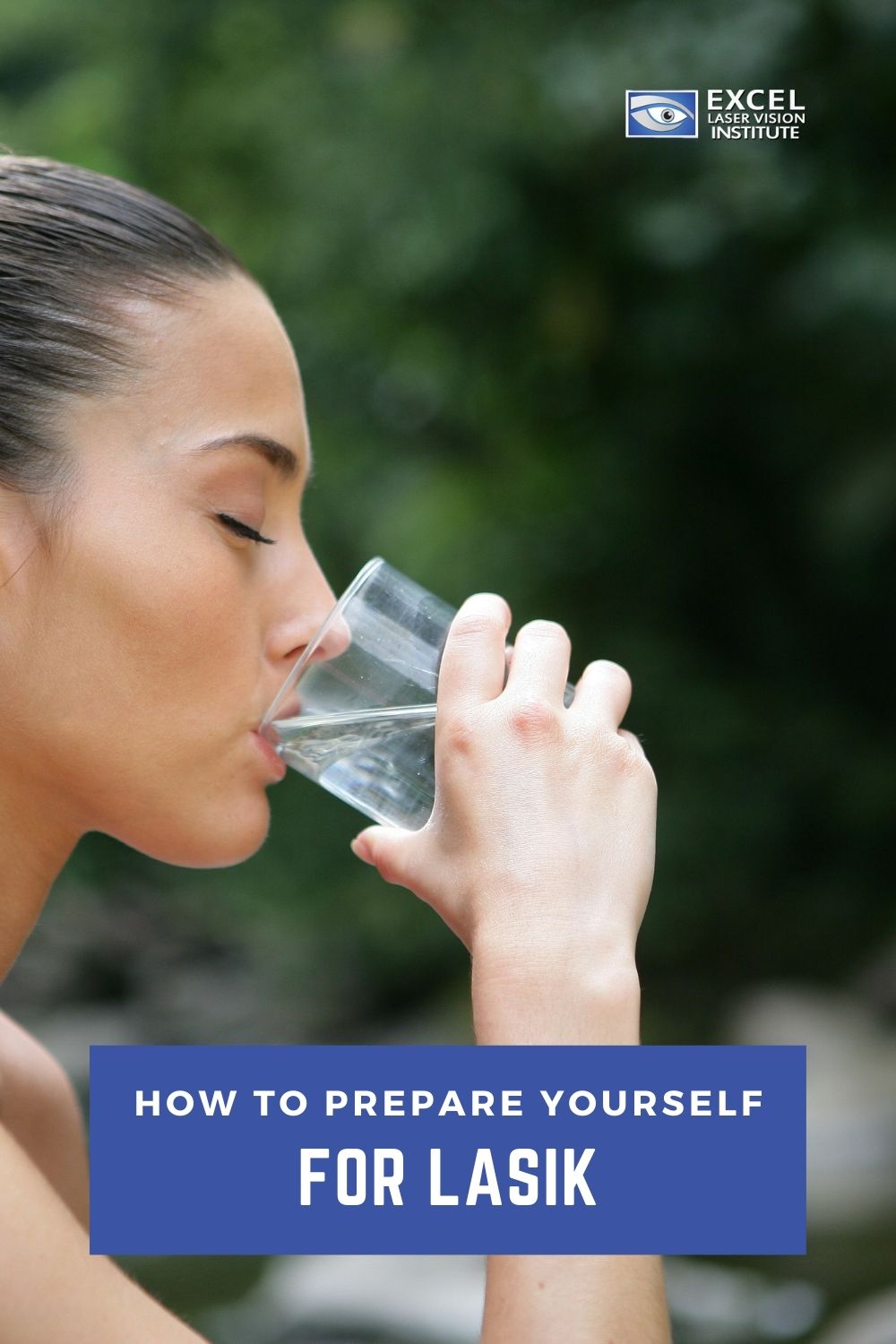
Hydrate
Water is necessary for your body to function at its highest capacity. Unless otherwise directed, be sure to consume plenty of water before your procedure. Hydration will allow your body to begin the healing process as quickly as possible. Plus, it will also diminish dry eye. Experts recommend at least 8 glasses of water a day (1 glass = 8 ounces). If you are not already meeting this requirement, then you will probably want to increase your water intake before your LASIK eye surgery in Orange County.
Discontinue Contact Lens Use
It is common practice for LASIK surgeons to ask patients to stop wearing soft contact lenses one week before their surgery (for hard contacts, one month before). This is because contacts have a hand in shaping the cornea, which can impact the effectiveness of the LASIK procedure. Make sure to check with your doctor so that you know exactly when or if you need to give your eyes a break.
Dress Comfortably
It’s normal to be nervous for a procedure, even one as quick and painless as LASIK in Orange County. So, in order to make yourself more comfortable, plan your outfit in advance. LASIK surgeons recommend wearing cool, loose clothing on the day of the surgery. This will help relax you at the eye clinic and also be convenient when you get home (and want to rest). LASIK experts also recommend avoiding clothes that produce lint. This is simply for sterilization measures in the operation room.
Get a Designated Driver
Not only will you need someone to drive you home after the surgery, but you may also like to have a friend that will help soothe you when you’re waiting for your procedure. LASIK is an elective procedure in which patients are given numbing eye drops. Patients are not put to sleep for the procedure. The procedure will be over before you know it! But, just in case you’re nervous about it, it would be nice to have someone with you through the process. Once your eyes are deemed healthy, your doctor will clear you to drive again (typically the next day).
Don’t Wear Makeup, Lotion, or Perfume
It’s imperative to avoid any contaminants on the day of your procedure. This includes products like lotion, makeup, and perfume. Anything that may interact with your eyes or irritate your eyes are strictly prohibited. This will ensure that your LASIK procedure runs as smoothly as possible. LASIK doctors recommend taking a shower or at least washing your face before leaving your house for the procedure.

